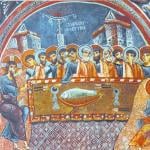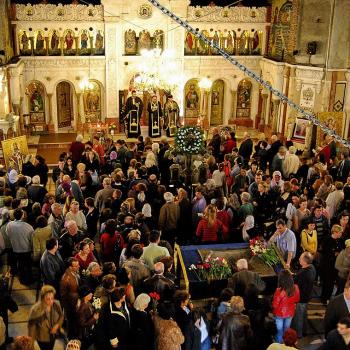
The spiritual life, and with it, the spiritual needs of different people, is not “one size fits all.” This is why not everyone will be aided by the same spiritual disciplines. There will always be a pragmatic element to spirituality. This is why, when various norms disciplines established which might help the majority of the people in a particular time and place, there might be some who need to be dispensed with those norms because, instead of helping them, those norms would hinder their proper spiritual development. The Eastern Christian tradition has taken this to heart, which is why it has constantly promoted the notion of economia over strict legalism, a notion which not only understands not everyone will find various disciplines beneficial, but sometimes some will never be able to follow them (out of no fault of their own), and they should not feel despair if they can’t. The norms are meant to be useful, and when they are not, other disciplines might be necessary instead, so as to make sure they do not become discouraged in the spiritual life and give up. Thus, the notion of economia reminds Christians that spiritual disciplines established by the church are the sake of the people, and not the people for the disciplines. We can see this in the writings of many spiritual masters, like, for example, the 19th century Orthodox abbess, Abbes Arsenia (Sebriakova); she pointed out how one normative discipline, the remembrance of death, is good, but yet could cause some people problems, leading them to despondency, and if so, they should rather reflect on something else, such as God’s loving mercy:
You have asked about the remembrance of death. It is good to have this, but within reason. When it encourages rejection of earthly things, compunction, humility, it is beneficial. But when it leads to despondency, the remembrance of death will lead not to salvation but to perdition. When one is despondent, it is more useful to think of God’s mercy, His goodness, His gifts that He freely bestows upon us, the salvation He grants to us through our life’s circumstances and even through our failings. Everything is good in its own time, but when it comes at the wrong moment, even that which is most beneficial can serve as a detriment. [1]
It is as the writer of Ecclesiastes said, there is a time and place for everything; what is good in one situation or context might not be good in another. For many, contemplating the fact that their lives will come to an end can be a good thing, as it will help them make sure they focus on the time they have, using it the best they can; however, for some, they become so afraid of death they cannot properly live, they become, as it were, too afraid to act they become frozen, incapable of spiritual growth, as all they do is await death while ignoring the good they thanks to their temporal existence. This is why it is very important to make sure, when we engage some spiritual discipline, we do so in moderation (and, if possible, with a skilled spiritual director). We need to live in the world, act in it, serving as Christ’s continuous presence in the world.
We must, therefore, find a proper balance in our lives. We must not forget that we will die, but also, we must not ignore the good which we have been given to live in the world. There is good for us to do in it, as well as many goods, many gifts, God gives to us in it which we should not ignore. We must not become prideful, but we must also not embrace false humility, the kind which has us deny our own dignity and value. And, we must realize that when we sin, when we have done wrong, we must not despair, giving up, for that only allows evil to fester without resistance, allowing it to grow until it takes us to our own destruction:
By the same token, if someone is in mourning over a sin which he has committed, he should not mourn excessively, lest he fall into despair and say, ‘There is no salvation for me,’ and because of that either not turn from his sin or suffer the suffering of Judas, who hanged himself because there was no possibility of repentance: that was excessive mourning. [2]
Our confession of sins, therefore, not only allows us to unburden ourselves of our sins, giving them over to Christ, but it is one of many times God gives us to reveal to us how God’s love for us will never be lost, no matter what we do. We should embrace that love, allowing God to provide us the grace we need to be the best person we can be, that is, to be who God wants us to be:
For, the confession of my past evils (which Thou hast ‘forgiven and covered up,’ so that Thou mightiest make me blessed in Thee, changing my soul by faith and Thy Sacraments) may, when they are read and heard, excite the heart so that it will not lie in a torpor of despair and say: ‘I cannot,’ but will rather wake up in the love of Thy mercy and in the sweetness of Thy grace, whereby every weak man is made strong, provided he becomes aware through it of his own weakness.[3]
Thus, while we must keep in mind that our temporal existence will come to an end, we should not use that to think our temporal existence is meaningless. If it were meaningless, God would not have given it to us. Rather, time, and what happens in it, is filled with meaning, and that is why, though we can and should be mindful of our death, we should also be mindful of the good of our temporal existence and the life which we have been given, indeed the good of all life, realizing that it is in our temporal existence we find experience the love which God has for us, a love which, if we are open to it, we will experience for all eternity.
[1] Abbes Arsenia (Sebriakova), Striving Toward God. Trans. Mary Naumenko (Jordanville, NY: Holy Trinity Publications, 2016), 44 [Letter 61 to Peter Alexandrovich Brianchaninov].
[2] Roberta Ervine, trans., The Blessing of Blessings: Gregory of Narek’s Commentary on the Song of Songs (Kalamazoo, MI: Cistercian Publications, 2007), 134.
[3] St. Augustine, Confessions. Trans. Vernon J. Bourke (Washington, DC: CUA Press, 1953; repr. 1966), 265.
Stay in touch! Like A Little Bit of Nothing on Facebook.
If you liked what you read, please consider sharing it with your friends and family!
N.B.: While I read comments to moderate them, I rarely respond to them. If I don’t respond to your comment directly, don’t assume I am unthankful for it. I appreciate it. But I want readers to feel free to ask questions, and hopefully, dialogue with each other. I have shared what I wanted to say, though some responses will get a brief reply by me, or, if I find it interesting and something I can engage fully, as the foundation for another post. I have had many posts inspired or improved upon thanks to my readers.













